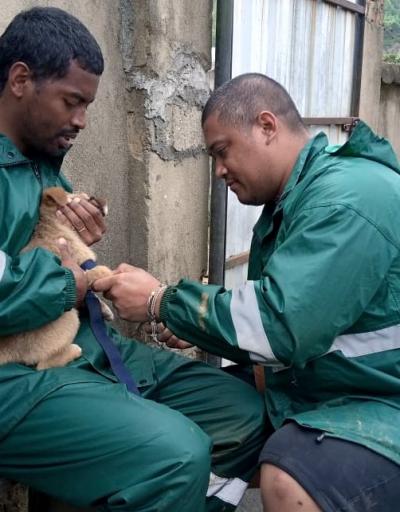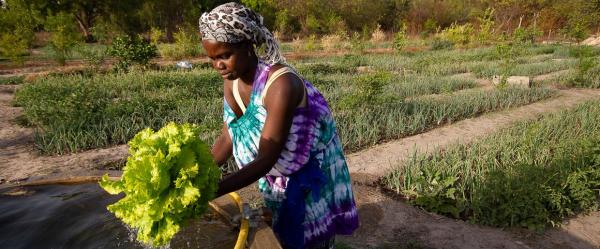Science at work 25 February 2026
- Home
- CIRAD news
- News
- Rabies: One Health alliance aiming for Zero by 30
Rabies: CIRAD and the Pasteur Institutes, a One Health alliance aiming for "Zero by 30"

99% of rabies cases in humans are the result of dog bites © H. Guis, CIRAD
Why, when a vaccine is available for dogs and a treatment for humans, is rabies still such an issue? CIRAD is working with the Pasteur Institutes in Cambodia (IPC) and Madagascar (IPM) on a One Health approach to reduce mortality from this largely forgotten tropical disease.
Some 95% of deaths from rabies worldwide are concentrated in Africa and Asia. CIRAD is working towards the "Zero by 30" target of ending human deaths from dog-mediated rabies by 2030. This global strategic plan was drafted by the World Health Organization (WHO), World Organisation for Animal Health (WOAH), FAO and Global Alliance for Rabies Control (GARC). It focuses on dog-mediated rabies, because 99% of human deaths from the disease are the result of dog bites.
Targeted vaccination of dogs could be the solution
In Cambodia, CIRAD and IPC have shown that targeted vaccination, which saves both vaccines and time, could be enough to eradicate rabies. "This no doubt also applies to other countries with similar dog population profiles to Cambodia", says CIRAD epidemiologist Hélène Guis, "but we don't yet have enough data to prove it".
These conclusions are the result of several studies. CIRAD and IPC recently demonstrated that rabies circulation between dogs in the country is closely linked to the ecology of local dog populations rather than to potential introductions of the virus from neighbouring countries.
Other work has provided a better understanding of the relations between humans and dogs, and estimates of the dog population and its demographic parameters. This information is vital for effective, feasible vaccination campaigns. Details of modelling work combining serology and canine ecology are also about to be published, in the hope of optimizing vaccination schemes. Equivalent research is also being conducted on a regional level (Cambodia, Thailand, Indonesia) within the GREASE platform in partnership.
Scientists have also been looking into the constraints on access to post-exposure prophylaxis (PEP) for Cambodians. The data gathered from their studies serves to pinpoint zones where opening new PEP centres would be most useful.
Two new projects in Cambodia
Two new projects on rabies associating CIRAD and IPC have been launched in 2023.
The first, under the umbrella of a thesis co-supervised by CIRAD and IPC, has three components:
- a study of 24 years of data on patients given PEP in Cambodia, to determine the temporal and spatial evolution of those populations, and particularly the impact of opening new PEP centres in the country;
- modelling and mapping distribution of the dog population nationwide;
- modelling the rabies burden, taking account of the new PEP availability landscape, dog population distribution and the impact of distance on access to PEP.
The second project, KAP Rabies, funded by the French Ministry for Europe and Foreign Affairs (MEAE) via its solidarity fund for innovative projects (FSPI) and implemented with the Cambodian Ministries of Public Health and of Agriculture, Forestry and Fisheries, has set out to assess knowledge, attitudes, practices and training requirements among human and animal health professionals in terms of rabies and its treatment. It also includes training for health staff and awareness-raising about rabies among the general public.
1000 human deaths a year in Madagascar
In Madagascar, work by Princeton, Glasgow and Antananarivo Universities, IPM, the Ministries of Public Health and of Agriculture, Livestock and Fisheries and CIRAD estimated that rabies killed almost 1000 people per year in Madagascar. The burden will only be reduced by combining improved access to anti-rabies treatment centres with awareness-raising campaigns, dog vaccination schemes and improved surveillance.
Scientists have pinpointed zones where better communication between sectors is required. A survey of the country's veterinarians revealed financial barriers to gathering, packaging and despatching samples from suspect animals and sociocultural obstacles, notably the fact that dogs are taboo for certain ethnic groups. According to another survey, treatment centres stick to the PEP protocol, but there are big differences between the country's 31 centres in terms of the number of patients treated, training courses completed and vaccine supply and storage issues.
Only 15% of people in Madagascar know about rabies treatment centres
A study by CIRAD, IPM and the country's Ministries of Public Health and of Agriculture, Livestock and Fisheries of knowledge, attitudes and practices in the Alaotra-Mangoro region showed that just 15% of the population knew that there were treatment centres and that knowledge and practices were poorer in rural zones. Rabies awareness-raising messages were transmitted in several rural parts of the Menabe region between two survey phases, revealing that such messages improved people's understanding, from 27% correct answers to 66%. Videos shown on various occasions had the greatest impact on awareness, reaching 85.6% of people. The study therefore showed that awareness-raising campaigns should be based on communication methods suited to the local context, to be sure of reaching rural communities with poorer knowledge and practices as regards rabies.
In Madagascar, a new project funded by the French MEAE via the FSPI, co-coordinated by CIRAD and IPM, began recently. It should serve to reduce human deaths from rabies in the capital, Antananarivo. Its levers for action centre on improved disease surveillance in humans and dogs, better knowledge of the demographics of dog populations, and increased vaccine cover among those populations. The project is being implemented in collaboration with the Direction des services vétérinaires (DSV) in Madagascar, the Direction de veille sanitaire, de surveillance et de riposte (DVSSER), the Direction des études, de la planification et du système d’information (DEPSI) at the Ministry of Public health and the NGO Mad Dog Initiative (MDI). It falls under the umbrella of the One Health-Indian Ocean platform in partnership.




























